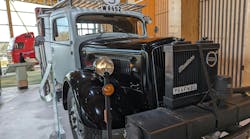One trucker's pad reduces excessive wear and tear on trailer suspensions
Manager: Greg Manchik
Title: President
Fleet: F.J. Manchik & Son Trucking, Inc., Richmond, MI
Operation: Gravel and material hauling
PROBLEM
Hauling heavy loads of gravel and other materials puts a lot of wear and tear on trailers. For Greg Manchik, those heavy hauls also put a big hole in his wallet.
“In our application, the hangers and equalizers wear out about every two years on our trailers,” he says. It takes a minimum of two hours to replace those components “and it's a dirty, pain-in-the-back job. We do all our maintenance in-house, so that's time and labor added to our overhead, not to mention the $1,200 it cost us in parts.”
Following in his father's footsteps, Manchik started driving gravel trucks right out of high school in 1977, and eventually had his own three-truck company. But when his father died unexpectedly at age 56 in 1993, Manchik took over his father's business, growing it into an 11-truck, 22-trailer fleet.
With years of do-it-yourself maintenance experience under his belt and the help of the skilled mechanics staffing his father's maintenance shop, Manchik began to look for a way to lengthen the life cycle of his trailers' hangers and equalizers.
SOLUTION
Initially, Manchik welded a steel plate into the hanger and equalizer in an effort to slow down the wear-and-tear process. But the plates were hard to maintain and eventually popped out.
A few years ago he started working with a more malleable substance — ultra-high molecular weight (UHMW) polyethylene, a type of Teflon — because he could bend it to conform to the shape of the parts he was trying to protect. Manchik found that after 10 months in the field, the “pads” he had created displayed very little wear.
“They were 3/8 of an inch thick when I put them on the trailer, and I found that only about 1/4 inch had worn off,” he explains. “I went right down to the patent office because I knew I was onto something.”
Dubbing his invention the “Warepad,” Manchik realized that material could be crafted to fit almost any type of spring-suspension trailer and, at least theoretically, if maintained properly could vastly extend the life of the springs.
“I make these pads bright yellow so a mechanic can visually inspect them and easily determine if they need to be replaced,” Manchik says. “And it takes only 15 minutes to change out the pad, versus the two hours [it takes] to replace the hanger and equalizer. From our tests so far, these pads last about two or three seasons.”
The best thing about these pads is that they're cheap: about $10 per pad. With a standard trailer containing eight equalizers and four spring rods, the total outlay per trailer is very small, he points out.
Manchik has been selling the warepads since 2004; they're being used in over 550 different trailer applications, including dump, tankers, freight and flatbeds.
“These pads have saved our company $1,200 per trailer every year. In this day and age, when you can hardly squeak out a profit [in trucking], that is a lot of money,” he says. “You need to always be as efficient as possible… with your maintenance so you can maximize your profits.”
Maintenance Bay presents case studies detailing how fleets resolve maintenance-related issues.


